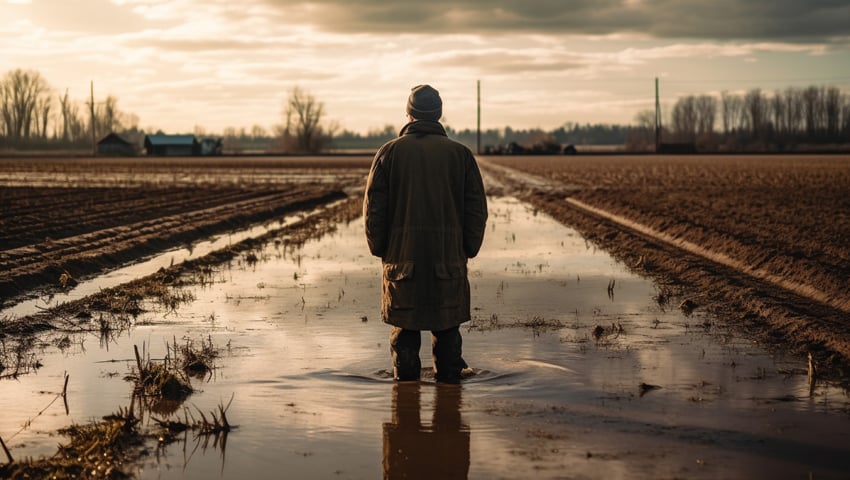IN ITS response to the Efra Committee’s rural mental health report published in May, the government states that the specific mental health needs of rural communities do not require targeted action and considers that existing provisions are sufficient to safeguard rural mental health.
The Efra Committee’s report found that rural workers including farmers face particular stresses, including unpredictable weather and animal health crises, as well as changing and uncertain government policies which can affect their incomes as well as their mental health.
MPs expressed deep concern about how isolation, poor public transport and a relative lack of digital connectivity have contributed to poor mental health outcomes for all categories of people across rural communities in England, but especially among farm workers and vets.
Vets, who regularly deal with animal mortality, epidemics and disturbing situations around TB testing, are especially affected by stress. A survey in 2018 of British Veterinary Association members found that 77% of those surveyed had been concerned about a colleague or fellow student’s mental health and wellbeing.
The government did not accept the committee’s calls to establish a National Working Group on suicide prevention specific to agricultural and veterinary occupations, claiming that their Suicide Prevention Strategy, published in September, encompasses those living in rural areas.
Rejecting the committee’s recommendation for a joint Defra/DHSC rural mental health policy and delivery team to ensure “rural proofing” of health policy, the government says “we believe existing channels would be a more effective way of achieving this.”
The government also turned down the calls for integrated interventions with the Department of Transport and the Department of Science, Innovation and Technology, aiming to improve access to rural mental health services, while citing a “range of actions”, reported in their June policy paper, Unleashing Rural Opportunities.
In its report the Efra Committee called for a consultation on the effectiveness of the ICS-model in providing access to mental health services to rural communities. The government rejects this recommendation.
On the mental health of young people, the committee made a headline recommendation of ensuring that all schools and colleges in rural areas have MHSTs (Mental Health Support Teams), by 2026/27. The government says it is committed to delivering on its Green Paper on Transforming Children and Young People’s Mental Health Provision. It states that MHSTs “will cover at least 50% of pupils in England by the end of the 2024 to 2025 financial year.” It is unclear how many of these will be in rural areas.
The committee made a range of recommendations pertaining to mental health and crisis events, such as flooding. The government tells us it has no plans for upgrading local preparedness for rural populations’ mental health following crises events, signposting the government’s websites on flooding and mental health, and says that the local mental health care provision currently in place is sufficient.
The committee also recommended a dedicated rural mental health care funding stream, which could be quickly accessed during and after crisis events. The Government says there are no plans for this, mentioning however that Defra and DHSC recognise the need to ensure that this support is provided.
The government currently has no plans to establish the Early Support Hubs for children and young people in rural areas, which were proposed by the Committee, instead saying that they are studying their effectiveness.
The government also rejected calls for a training programme specific to rural mental health provision as called for by the committee, claiming that training currently in place is sufficient.
The committee’s report recommended that the Farm Resilience Fund prioritise providing mental health support. The government states that the fund provides free business support to farmers and that “the type of expert business support available is expected to have a positive indirect impact on farmer wellbeing”, and that advisors will signpost mental health and wellbeing support services where appropriate.
The committee asked for the government to set out how rural proofing has been applied to the Levelling-up and Regeneration Bill. The government does not certify explicitly whether or how rural proofing has been applied but says that the bill, now an Act, will benefit rural communities, since it will benefit all communities.
On rural youth services, the committee recommended an additional mission on young people’s mental health being included in the Levelling up Bill, a consultation on rural youth services and an undertaking by the government to make up for any short fall in the provision of rural youth services in the next ten years. Responding to the Efra Committee, the government refers to The Youth Review, conducted in 2021 by DCMS, saying that that review covered the needs of young people across the country, including rural populations, and that therefore it would be too soon to have a consultation specific to rural youth services.
Chair of the Environment, Food and Rural Affairs Committee, Sir Robert Goodwill, said, “Our committee was hopeful that the government would recognise the distinct needs and circumstances of the rural population and would follow our carefully considered recommendations to support and protect them. While we recognise that the government has taken measures to support the mental health of the general population, we are disappointed by its rejection of measures to support the specific and identifiable mental health needs of those who live in rural areas.
“This was an opportunity to make significant changes which could greatly impact our rural communities. With this response the government demonstrates a worrying degree of complacency on the issue and so will fail to confront the significant problem of improving rural mental health.”
Read the Efra Committee’s report ‘Rural Mental Health’ (published May 2023)
